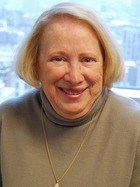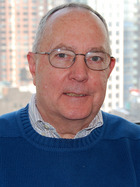For Breast Cancer
- Q.
How long after completing breast cancer treatments can you still feel fatigued? Should I have any special follow-up?
A.For women who have had radiation as part of their treatment, it can take several months until their normal level of energy returns and most women report that it takes about a year after completing treatment that they begin to feel like their old selves. Remember, each person’s response to treatment is different so be patient with your recovery. It might be helpful to join a support group to find out ways others are managing these challenges.
Fatigue is one of the most common complaints of women dealing with breast cancer. Whether it is caused by chemotherapy, radiation, taking an aromatase inhibitor or simply by stress it needs to be addressed. The first thing to do is to discuss with your doctor why you are so tired and what can be done to help.
There are some simple things you can do to help yourself:
- Pace yourself but try to stay active; conserve your energy for your priorities and find your own comfort level.
- Take power naps, a 30-minute nap can help without disturbing your night’s sleep.
- When friends or family ask what they can do-delegate! For instance, let them drive to soccer practice or pick up the groceries.
- Try simple exercises such as walking or yoga, which can help regain energy and clear the mind.
As for follow-up care, most surgeons and oncologists will continue to follow a patient at six-month intervals for the first year or two, and then on a yearly basis. Depending on whether you are continuing to take Tamoxifen or other hormonal blockers, your oncologist will schedule visits at intervals of three or six months and yearly for the next five years if you remain symptom free. Your oncologist will continue to do blood work at these visits and unless you have had bilateral surgery, you should continue to have your regularly scheduled mammograms. You can find more information though the American Cancer Society’s publication, Follow Up After Breast Cancer Treatment.
For Lung Cancer
- Q.
I was diagnosed with non-small cell lung cancer and am receiving chemotherapy. I've had two colds within a three-week period and also a low level of hemoglobin in my blood (the doctor has recommended erythropoietin treatments). Could these issues be diet related?
A.Chemotherapy for either small cell or non-small cell lung cancer tends to be fairly aggressive and can produce some difficult side effects. While chemotherapy is focused on destroying lung cancer cells it can also interferes with the production of the three types of blood cells: red blood cells, white blood cells, and platelets. Normally, just before you start a chemotherapy session, your doctor arranges for you to have blood tests to determine the effect the chemotherapy is having on your blood cells. Low counts of any of these cells may prompt either a change in dosage or frequency of treatment, or a need to take medication that can stimulate bone marrow production of the blood cells.
Your colds may be due to the chemotherapy’s suppression of the bone marrow’s production of white blood cells, which are the body’s infection fighters. If your doctor feels that your white cell count has significantly decreased, he or she may consider putting you on a medication for this condition. Ask your doctor whether this might be a possibility.
Similarly, the low levels of hemoglobin you mention may be due to low red blood cell counts caused by chemotherapy. Red blood cells carry oxygen and iron to provide the body with components necessary for energy. Red blood cells are an important factor in maintaining energy levels in our bodies and too few of them can result in fatigue and anemia. It sounds like your doctor believes an erythropoietin-type drug might be helpful in boosting your red blood cell count. While extreme low red blood cell counts are not normally related to diet, you might also want to ask your doctor for a referral to a dietitian who works with cancer patients to develop a meal plan that would increase your dietary intake of iron and help you maintain a healthy weight.
CancerCare offers publications that provide more detailed information on managing chemotherapy side effects.
For Lymphoma
- Q.
I finished my chemotherapy for anaplastic stage IV lymphoma over a year ago, but I still must nap every day. Will there come a day when I will not be so exhausted?
A.Fatigue is one of the most common side effects of cancer treatment and ranks at the top of symptoms reported along side of pain. More often medical experts focus on treating pain rather than fatigue because of the degree of discomfort for the patient. However, over the long term, fatigue can have an equally profound effect on quality of life for many patients. Simple activities of daily living can take longer, require more energy, and be debilitating. The end result is that people may retreat from many of the activities that brought them happiness prior to cancer treatment.
Fatigue is an expected side effect of chemotherapy and radiation and usually dissipates over time after treatment has ended. But in some cases, it can go on for years or become a chronic condition. There are three factors one needs to look at when addressing fatigue: physical, psychological, and emotional. Sometimes only one factor may be the cause of fatigue; other times it might be a combination. Interventions to combat fatigue can be pharmacological, behavioral or psychological. Integrative medicine practices (e.g., acupuncture, meditation and vitamin supplements) can also be utilized. Fatigue during treatment, or lingering well past, should be discussed with your oncology team and be explored with other medical specialists as needed. In some instances, the underlying cause of chronic fatigue might not be identified, but with help, people can find ways to adapt and still enjoy a full life.
To learn more about coping with fatigue, please watch Memorial Sloan Kettering’s informative webcast, Coping With Fatigue After Cancer Treatment.

 Answered by
Answered by  Answered by
Answered by  Answered by
Answered by